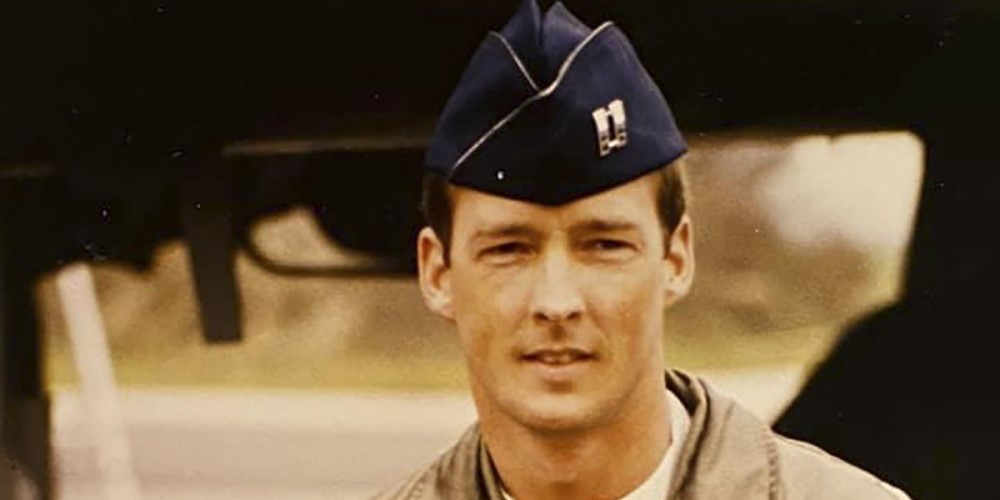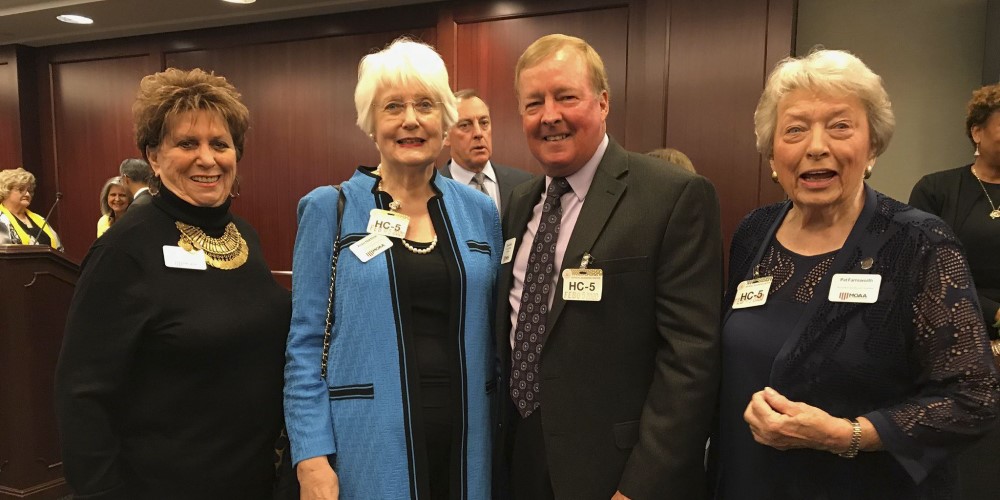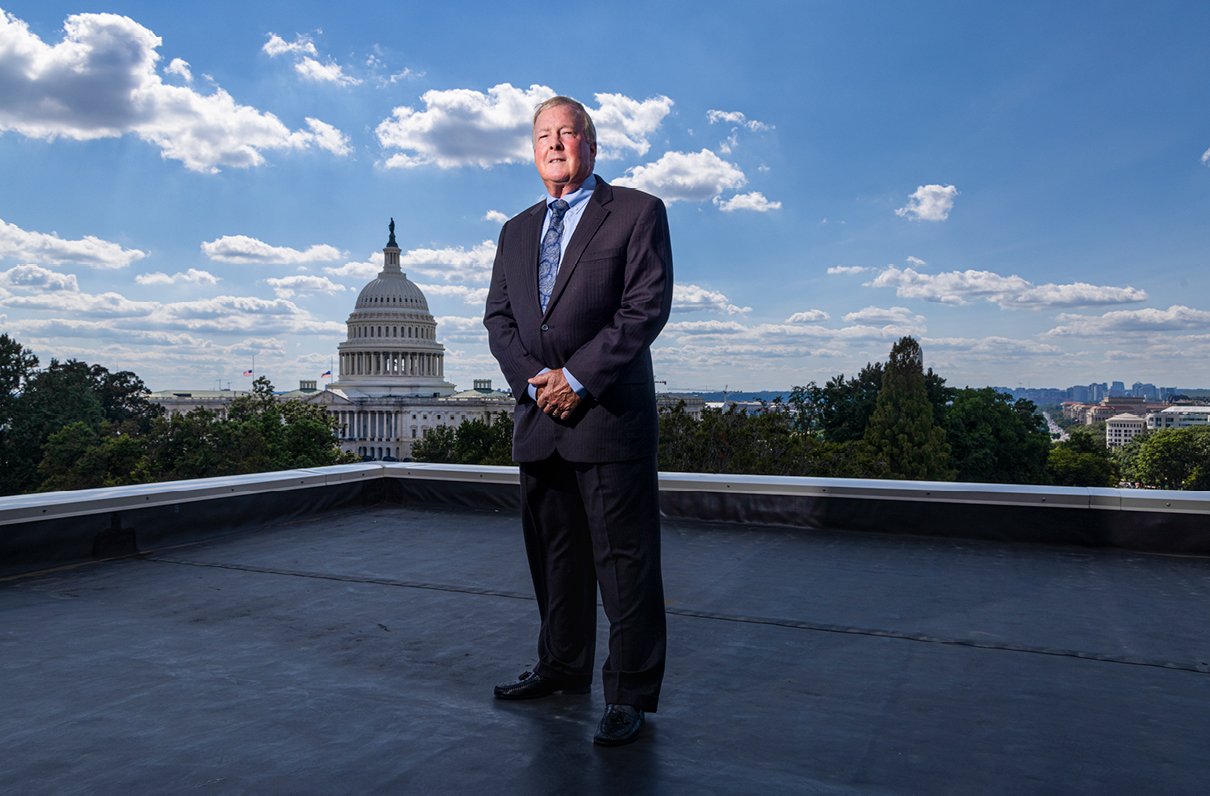Fresh out of high school, Dana Atkins had ambitions. He wanted a higher education, a challenging career, and, like most young men, he wanted to venture out on his own. But he also needed help.
“My parents didn’t have the resources to send me to college,” he said. “They told me, ‘You’re going to have to go out and earn your own tuition and whatever other expenses come along with that.’ ”
And so, in 1972, when national sentiment toward the military was extremely low and his own peers were dubious, Atkins saw a path.
“If you stayed four years, you got four years of university assistance at the university of your choice,” he said. “I just needed help, and the Air Force offered me that help.”
So, like many recruits back then and now, he had a pragmatic reason to sign a contract. And like so many others, soon after came that sense of patriotism the military instills, of service to country and a mission greater than oneself.
[RELATED: MOAA Named to Top Lobbyist List for 16th Consecutive Year]
His military career would take him all over the world, flying 4,000 hours in fighter aircraft and leading troops in Japan, Korea, and Europe. He flew for the European A-10 Demonstration Team and as a Thunderbird.

Atkins initially joined the Air Force to help pay for a college education. (Courtesy photo)
Fast-forward to 2016 when, after his military retirement and a second career as a media executive, he again felt the desire to serve in the military community. This time he would fight to protect and improve benefits for the military community, veterans, and families, as the ninth president and CEO of the Military Officers Association of America.
“General Atkins was particularly well-positioned to be the CEO of MOAA when he was chosen,” recalled former MOAA Chairman Adm. Walt Doran, USN (Ret). “He had a stellar tour in the U.S. Air Force as a fighter pilot, and he also had a very significant run in business.”
This December, after seven years as MOAA’s leader and some of the biggest legislative victories in MOAA’s history, Atkins will retire. His tenure saw the association grow in membership and in national awareness, and it became stronger financially and technologically. New charitable causes emerged as more members of the military community received assistance.
“Everything we do impacts somebody’s quality of life in a positive way, whether we improve your opportunities or whether our legislative success contributes to the well-being of your family,” Atkins said. “You gotta feel good waking up in the morning and doing this.”
The Widows Tax
For decades, service organizations had lobbied to eliminate the Survivor Benefit Plan-Dependency and Indemnity Compensation offset, commonly known as the widows tax. This unfair law shortchanged surviving spouses whose servicemember died in the line of duty.
Atkins, a longtime MOAA Life Member, was familiar with this injustice, and when the position of MOAA CEO opened, eliminating the offset was his No. 1 reason to apply. His motivations trace back to a promise he made to Maj. David Brodeur, USAF, his executive officer of 11th Air Force at Joint Base Elmendorf-Richardson, Alaska. Brodeur had been chosen to serve as an advisor in Afghanistan in 2011. He and eight other Americans were killed that April when an Afghan pilot opened fire at Kabul International Airport.
“I promised David I would take care of his family while he was deployed,” Atkins said. “I didn’t realize it was going to be an enduring promise.”
Susan Brodeur, David’s widow, was one of those spouses affected by the SBP-DIC offset, and Atkins saw this as an opportunity to help Susan and the thousands of others like her.
The widows tax elimination became a greater focus under Atkins’ leadership, said surviving spouse Kathy Prout, who herself fought tirelessly on this mission and helped rally a grassroots effort online and across the country.

Atkins presided over several legislative victories for MOAA, including the repeal of the so-called "widows tax." (Photo by Jennifer Milbrett/for MOAA)
“He made me and the other surviving spouses feel heard. That our issues were heard,” Prout said. “Before that, we were kind of like dangling participles.”
In 2019, the offset elimination finally made it, appearing in the 2020 National Defense Authorization Act. The repeal was phased in and fully takes effect in January 2023.
“For me, the good feeling was that it was such a collaborative effort,” Atkins said. “It was VSOs, it was Gold Star wives, it was surviving spouses. It was real bipartisan. You witnessed everybody bound together to do the right thing.”
Susan Brodeur remains close to Atkins and his wife, Laura.
“It’s going to be really sad to see him retire because, just like when he retired from the Air Force, we’re going to lose someone who would go to bat for the little guy,” she said.
Preserving Your Benefits
Under Atkins’ leadership, MOAA maintained an association-wide focus on pay raises for the troops, preventing medical billet cuts, protecting TRICARE for Life, and reducing the impact of TRICARE fee hikes. The Hill named MOAA to its list of top lobbyists every year Atkins led MOAA.
Legislative victories in health care spanned generations. The Blue Water Navy Vietnam Veterans Act of 2019, signed by the president, helped 90,000 veterans who served off the coast of Vietnam but were exposed to Agent Orange. In 2022, landmark legislation was passed in the form of the PACT Act.
[RELATED: 12-Week Military Parental Leave Benefit Will Be in Place by Next Month]
The Sergeant First Class (SFC) Heath Robinson Honoring Our Promise to Address Comprehensive Toxics (PACT) Act of 2022 will benefit millions of troops, from Vietnam-era veterans to those serving today.
Gen. Walter Sharp, USA (Ret), MOAA’s chairman from 2020-22, said COVID could have posed a challenge to MOAA advocacy during this time period. Instead, Atkins led a migration to online advocacy with virtual meetings and phone calls.
“It was tough times, but he was able to do that,” Sharp said.
Job Support
While serving in Europe on the A-10 Demonstration Team in the mid-1980s, the Thunderbirds came through Royal Air Force Base Bentwaters, and Atkins was tapped to serve as project officer for the visit. He told his wife, Laura, that night he wanted to apply to join the elite team of pilots.
“My wife has been remarkably supportive throughout my entire career,” Atkins said. Some of his comrades were less optimistic. “My peers were like, ‘Atkins, you’re fooling yourself. You don’t even fly the plane they fly!’ ”
But with the support of his commander, his mentors, and his wife, Atkins applied. It took two tries, but he made the team.
“Don’t let people who don’t have any influence on that process tell you that you can’t do it,” Atkins said. He’s taken career lessons like this and applied them at MOAA.
Under his leadership, MOAA has maintained relationships with more than 40 military installations and delivered career transition, financial and benefits education, and military spouse-focused professional development support.
Second Career in Business
Atkins’ business acumen stood out among candidates for MOAA’s 9th president. After retiring from the Air Force in 2012, he took the role of president of The Augusta (Ga.) Chronicle and Chronicle Media. Serving in this role for nearly four years, Atkins applied his military know-how, but he also gleaned new lessons in managing a corporation and planning for and navigating economic challenges and demands.
[RELATED: It’s Time to Tackle Your Transition To-Do List]
He brought this expertise to MOAA and led a bottom-up review, restructuring or eliminating programs that did not provide an adequate return on investment. He formalized the strategic planning process and integrated it into our normal business. In 2018, Atkins spearheaded the $9.5 million renovation of the headquarters building, which was completed on time and within budget in 2020. He also strengthened MOAA’s technology and cybersecurity.
Dedication to Chapters
After four years in the business world, Atkins yearned for a return to military work, Laura Atkins said.
“It was going to be more of what he liked to do and to be integrated again with the military,” she said. “When you are part of the military family you are always accepted, and you are part of it. The camaraderie, shared experiences, and understanding.”
Dana Atkins made camaraderie at MOAA a priority, making countless chapter and council visits in his tenure.
“What you really witness at the chapters is the commitment,” Atkins said. “Chapter meetings afforded you a lot of valuable interaction you don’t get anywhere else.”
[RELATED: MOAA Announces New President & CEO, Chairman and Board Members]
In his tenure, MOAA launched a quarterly chapter leader workshop, provided technology allowances to council presidents, and created new virtual chapters to unite members across the country through a common bond.
Charitable Giving
Founded in 1948, the MOAA Scholarship Fund is an institution that has provided $160 million to students in military families. Atkins’ son and daughter, now grown with kids of their own, are among the 17,000 students who have benefitted.
It has proven financially resilient and has led to significant growth and opportunity for military families. Grants have increased from about $1 million five years ago to about $3.6 million in the upcoming 2022-23 school year.
The MOAA Foundation, created in 2014 before Atkins’ arrival, has matured in mission and support.
[RELATED: MOAA.org/Donate]
The foundation’s original vision called for supporting programs on career transition, community outreach, spouse professional development, and professional education. A fifth arm was added in the early stages of the pandemic — the COVID-19 Relief Fund. This provided emergency financial assistance grants for currently serving troops, spouses, veterans, and caregivers. From this program, an enduring effort called the Crisis Relief Fund was born, providing help during national disasters. Funding has already supported members of the military community displaced by flooding in Kentucky and hurricanes in Florida and the Carolinas.
Saying Goodbye
After seven years, Atkins says it’s a good time to step down and welcome a new leader who can bring fresh energy and ideas to the table.
“Dana’s time as the president and CEO of MOAA was truly a terrific period of time,” Doran said. “It was a team effort to bring home some great victories for veterans and military families.”
The hard work always gave back, Laura Atkins said.
“He loves, loves, loves, MOAA,” she said. “I know that his fondest moments came in leading people, knowing he positively changed their lives.”
Dana Atkins is planning to spend more time with his mother, Shirley, who is in her 90s and lives in Arizona; visiting his son, Master Sgt.-select Geoffrey Atkins, USAF, and his daughter, Kristen, and both their spouses; and his four grandkids.
You may find him volunteering soon at a USO at Dulles International or see his name pop up on a service organization board. It won’t all be about improving his golf game.
“I can’t see myself becoming idle,” he said. “It’s not in my DNA.”
Support MOAA Charities
Donate to the MOAA Scholarship Fund and The MOAA Foundation at the link below.

